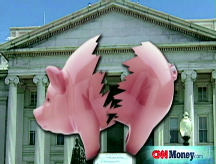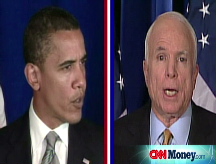The credit crunch: Loans out of reach
The market meltdown has caused banks big and small to tighten their credit standards, making it tougher to get loans for a home, car and even college.
NEW YORK (CNNMoney.com) -- Interest rate spreads. Libor. Collateralized debt obligations.
Unless you're fluent in the language of high finance, it's tough to make heads or tails of all the terms being tossed around in the headlines lately.
Simply put, the meltdown on Wall Street has made it tough for many Americans to get a loan to buy a home, purchase a car, start a business or even send a kid to college.
And with all the talk of a credit crunch -- some are even calling it a credit freeze -- it may get even tougher.
But instead of relying on arcane numbers to show that banks are more reluctant to lend to you and me, as well as to each other, we decided to speak to banking executives and have them explain how their lending standards have changed.
The financial turmoil is affecting banks of all sizes -- from rural community banks to one of the nation's largest banking giants. Here's how.
While the credit crisis has shaken Wall Street to its core, the thousands of community banks that make up the lion's share of the nation's banking system remain, to a large extent, quite secure.
"Our lending window continues to remain open," said Jonathan Fox, the chairman and CEO of The Fowler State Bank, a Colorado-based bank an hour's drive from Pueblo with about $56 million in assets.
Fox admitted that, since the credit crunch began, his bank has taken a harder look at the value of a piece of real estate involved in a loan as well as a customer's income.
But he said that his bank, which traces its roots back to 1899, can continue to lend freely because they didn't get caught up in the subprime mortgage market.
Fowler is not unique in this regard either.
Karla Wilbur, a senior vice-president at Passumpsic Savings Bank in St. Johnsbury, Vermont, said that an existing customer with a good credit standing and steady income who applies for a home equity loan could very well qualify for it.
She said the 11-branch bank, which serves towns along the Vermont-New Hampshire border, has ratcheted back on some of its non-core loan business -- such as buying loans from car dealerships or doing joint commercial loan deals with other banks.
But she added that the bank's consumer lending business hasn't been affected all that much following the panic that spread through the credit markets last week.
"It pretty much looks like it did a month ago or two months ago," said Wilbur. "Things haven't changed a lot."
It may still be business as usual for customers of small banks. But the higher up in the bank food chain you go, the tougher it seems to get credit.
At larger institutions, such as the San Francisco-based Bank of the West, which has approximately 700 branches mostly west of the Mississippi River, consumers need a better credit score than they did before the credit crunch hit.
"We have seen a change in the landscape and responded to it," said Bruce Heysse, an executive vice president for Bank of the West's consumer lending business.
Consumers whose credit rating teeters between 'good' and 'not so great' are the ones getting squeezed the most, added Carole Merchant, a fellow Bank of the West executive vice president in the company's indirect lending business.
"Will loans be available for people who have some sort of credit blemish? That will probably remain more difficult," said Merchant.
Given the current state of the economy, banks such as the San Antonio, Texas-based Cullen/Frost (CFR), have been forced to withdraw lines of credit from some customers.
Still, the lending spigot hasn't been completely shut off. Instead, Dick Evans, chairman and CEO of Cullen/Frost, said that his bank is charging customers higher rates for loans than they did before.
"We have tightened from the standpoint that we get paid for the risk," said Evans, whose bank focuses primarily on business lending and had more than $13 billion in assets as of the end of last year.
Finally, customers of big banks may face the toughest time getting approved for new loans.
As home values continue to sink across the country, borrowers looking to get home equity loans are finding they are limited in how much they can borrow against their home. That's especially true at many of the nation's biggest banks, such as Citigroup (C, Fortune 500), Washington Mutual (WM, Fortune 500) and Wachovia (WB, Fortune 500), which have been hit hardest during the mortgage meltdown.
But even JPMorgan Chase (JPM, Fortune 500), which has emerged as one of the strongest banks in the wake of the credit crisis, is taking a closer look at borrowers as well.
Tom Kelly, a spokesperson for the New York City-based bank, acknowledged that the company has had to tighten lending standards over the past year.
"Last month, a student who was looking for a college loan qualified with a co-signer," he said. "A year ago that student, with a marginal credit history might have qualified on their own."
Experts are hopeful that banks will become more comfortable lending more freely again if the $700 billion bailout package, which is currently being hashed out on Capitol Hill, is approved.
But until then, it will continue to be tough for many Americans to get new loans from banks. ![]()



